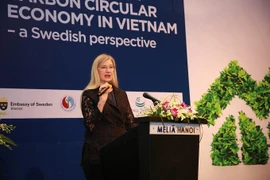A couple of months ago, the young businessman launched his recycled CaptoeOxford shoe brand ShoeX as his first foray into the concept of closed-loopdesign, whereby materials used in the products are infinitely recycled.
“When you open your wardrobe and see tens ofpairs of shoes, you will ask yourselves about the special stories behind them,”Thanh said.
In September this year, Thanh won 4 billion VND (172,000 USD) from Shark TankVietnam for his application Scanfit; however, he decided to use the money onR&D for ShoeX after realising the app was not suitable for the Vietnamesemarket. Vietnam is facing serious environmental pollution, and given that thefashion industry as a whole produces 10 percent of all carbon emissions andpollutes the oceans with microplastics, the industry must take responsibilityfor the issue.
Besides, he was concerned about a lack of awarenessof sustainable development, especially after visiting North America where hemet a young boy who was able to tell what sustainability really is.
After looking at a wide range of approaches to develop products, he chose“making money while promoting sustainable development”, and the closed-loopShoeX was born.
From waste to treasure
Being made from used coffee granules and plastic cups, ShoeX is truly a veganpair of shoes.
“The process of making shoes starts with collecting old coffee from coffeechains around Ho Chi Minh City. The soles of the shoes are made using 150grammes of coffee grind and 12 plastic cups, and the process is all done here.Meanwhile, we are importing coffee yarn from China’s Taiwan to make the bodiesof the shoes,” Thanh said.
Thanh is planning to purchase around 4 tonnes of coffee each year to make ShoeXsoles.
Regarding functionality, Thanh said the shoeshave a waterproof membrane together with coffee fabric insoles which ensurepeople’s feet stay dry in any conditions. The coffee also creates micro-pocketsthat trap odour and help the outer layer to dry 200 percent faster than regularshoes.
And as a bonus, with natural antibacterial qualities, coffee also prevents theshoes from smelling, he added.
Besides that, coffee has UV-blockingproperties to ensure the colour of the shoes stay brighter for longer.
Each pair allegedly smells like coffee too, sousers will always be reminded of their favourite beverage.
Currently, Thanh imports the materials for the shoe bodies from Taiwan, butthanks to the abundance of coffee grown in Vietnam, he is looking at sourcingdomestically.
ShoeX promotes development of circular economy
Thanh’s efforts tomake shoes from recycled materials play an important role in making the economygo circular, in which waste and pollution are reduced while natural systems arerestored.
The World Economic Forum (WEF) 2018 estimated that every day more than 2billion cups of coffee were consumed across the globe, with six million tonnesof wet and waste coffee ground sent to landfill sites every year. This has acritical impact on the environment as decomposing coffee releases methane intothe atmosphere while methane is the second-most abundant greenhouse gas and hasa global warming potential up to 86 times greater than carbon dioxide.
In Vietnam, theincredible coffee culture has been consolidated with mushrooming coffee chainsas well as street coffee vendors becoming a staple on every corner. Vietnamesepeople drink around 17 billion cups of coffee a year, which means they use 46.5million cups per day.
According to Indian-basedmarket research firm Ken Research, Vietnam’s domestic consumption of coffee hasbeen growing at 7.9 percent annually, while BMI Research, a subsidiary ofratings firm Fitch, estimates consumption grew from 0.43 kilogramme per personin 2005 to 1.38 kilogrammmes in 2015.
This is the highestgrowth rate of any global coffee exporter, and the figure is forecast to reach2.6 kilogrammes by 2021, BMI said.
As the detrimental wasteis a calamity in itself, while the world and domestic coffee drinking habit isunlikely to wane, Thanh thought it is crucial to find ways to recycle and reusethis material.
ShoeX was launched in July this year and has sold some 10,000 pairs of shoes.This means 1.5 tonnes of coffee and 120,000 plastic cups have been recycled.Thanh is planning to transform the spent coffee grounds and use plastic on anindustrial scale, helping to give new life to materials previously consideredas waste. Particularly, his coffee shoes are biodegradable within five to tenyears.
 The creation of ShoeX was not only to make money, it is a journey to persuade customers to make sustainable choices. (Photo courtersy of Thanh)
The creation of ShoeX was not only to make money, it is a journey to persuade customers to make sustainable choices. (Photo courtersy of Thanh)With Thanh, the creation of ShoeX was not only to makemoney, it is a journey to persuade customers to make sustainable choices. Infact, ShoeX has won over many Vietnamese people, who are ready to pay over 1.9million VND (81.62 USD) for a pair of shoes that protect the environment whilemaking a fashion statement, Thanh said.
Thanh believes in order to shape a circular economy in Vietnam, there should bemore brands like ShoeX who can together create a trend for recycling as ShoeXalone cannot speak loudly enough about environmental protection. He alsopointed out that it is not difficult for businesses to recycle waste, and wasteclassification at source will provide firms with reliable supplies to makeproducts.
[Vietnamese bamboo straws adorn world drinks]
Vietnam is forming circular economy
At a macro level, Vietnamhas policies to facilitate the circular economy. In 2017, the Prime Minister approveda project to form an environment industry that can meet the contents of thecircular economy by 2025.
The Ministry of Industry and Trade is currentlydrafting a National Action Programme on Sustainable Production and Consumption,which will be implemented from 2021-30.
At a local level, big cities like Hanoi and HoChi Minh have set a series of goals including reducing 60 percent of plasticbags by 2020 at supermarkets and trade centres and 50 percent in traditionalmarkets.
Meanwhile, renewable energy and new energy willreach 1.7 percent of total energy capacity. At the same time, the relocation ofpollution production facilities in residential areas is ongoing./.































